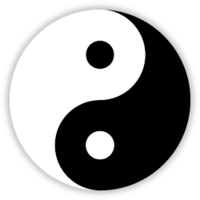Perception of interdependent opposites: Difference between revisions
>Oskykins m Oscarette moved page Effect:Feelings of interdependent opposites to Feelings of interdependent opposites |
>Oskykins m Text replace - "Cognitive effects: Ego suppression, loss and death" to "Ego suppression, loss and death" |
||
| Line 1: | Line 1: | ||
<onlyinclude> | <onlyinclude> | ||
[[File:Yinyang2.png|200px|thumbnail|right|In Chinese philosophy, [http://en.wikipedia.org/wiki/Yin_and_yang yin and yang], are concepts used to describe how opposite or contrary forces are actually complementary, interconnected and interdependent in the natural world.]] | [[File:Yinyang2.png|200px|thumbnail|right|In Chinese philosophy, [http://en.wikipedia.org/wiki/Yin_and_yang yin and yang], are concepts used to describe how opposite or contrary forces are actually complementary, interconnected and interdependent in the natural world.]] | ||
'''Feelings of interdependent opposites''' (also known as '''feelings of duality''') can be described as a state of mind that often accompanies [[ | '''Feelings of interdependent opposites''' (also known as '''feelings of duality''') can be described as a state of mind that often accompanies [[Ego suppression, loss and death|ego death]]. It is a powerful sensation in which one sees, understands and physically feels that reality is based upon a system in which the existence or identity of all concepts and situations depend on the co-existence of at least two conditions which are opposite to each other, yet dependent on one another by presupposing each other as logically necessary equivalents. | ||
This experience is usually felt to provide deep insight into the fundamental nature of reality and results in the revelation that fundamental concepts such as life and death, up and down, light and dark, good and bad, big and small, wet and dry, pleasure and suffering, yes and no, something and nothing and being and non-being each exist as states of harmonious and necessary contrast to their opposite force. | This experience is usually felt to provide deep insight into the fundamental nature of reality and results in the revelation that fundamental concepts such as life and death, up and down, light and dark, good and bad, big and small, wet and dry, pleasure and suffering, yes and no, something and nothing and being and non-being each exist as states of harmonious and necessary contrast to their opposite force. | ||
Revision as of 01:41, 28 September 2014

Feelings of interdependent opposites (also known as feelings of duality) can be described as a state of mind that often accompanies ego death. It is a powerful sensation in which one sees, understands and physically feels that reality is based upon a system in which the existence or identity of all concepts and situations depend on the co-existence of at least two conditions which are opposite to each other, yet dependent on one another by presupposing each other as logically necessary equivalents.
This experience is usually felt to provide deep insight into the fundamental nature of reality and results in the revelation that fundamental concepts such as life and death, up and down, light and dark, good and bad, big and small, wet and dry, pleasure and suffering, yes and no, something and nothing and being and non-being each exist as states of harmonious and necessary contrast to their opposite force.
See also
- Subjective effects index
- Psychedelics - Subjective effects
- Dissociatives - Subjective effects
- Deliriants - Subjective effects